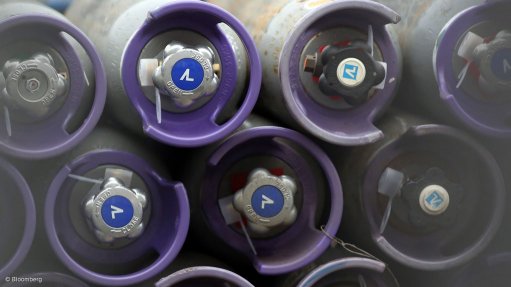Focus on hygiene can contribute to health, safety


EMMA CORDER Mines that follow a suitable cleaning regime reduce the amount of air pollution, limiting the exposure for employees and residents of the surrounding communities
Owing to high safety risks, mining is considered one of the most hazardous industries and, compared with 2020, South Africa, which has some of the deepest and oldest mines in the world, has already seen a 33% increase in mine deaths in the first half of 2021. This regression in safety has government, mining authorities and unions focused on improving safety in the industry.
“The safety and cleaning of mines goes hand in hand,” says cleaning products and equipment manufacturer Industroclean MD Emma Corder.
“In terms of hygiene, the Mine Health and Safety Act seeks to establish, maintain and record hygiene measures, but among the top challenges in this sector is missing the link between safety and hygiene,” Corder continues.
Hygiene practices such as sanitation, sterilisation and disinfection, which are crucial to medical environments, are just as vital to the mining industry, she adds.
She explains that the industry has very specific cleansing challenges, especially below ground which makes it vital to appoint a cleaning partner that can assist with all aspects of mine cleaning and hygiene, as well as provide training on how to use its products safely and efficiently.
The cleaning methods and products used are dependent on the areas that need to be cleaned. Below ground, the areas that need focus are underground workshops, wash bays and machinery. With strict regulations in place for the type of equipment that can be used because of the dangers posed by diesel fumes, electrically-powered cleaning equipment that is able to deal with constrained spaces is ideal.
Powerful automatic scrubbers and sweepers with high brush pressure are suitable for underground use in workshops, she points out.
At opencast mines, the priority is any area where machines are loading ore into dump trucks and/or the specialised sections in workshops where engines are removed and cleaned. Hot water pressure washers, sweepers and automatic scrubbers can be deployed in these spaces.
Surface mines usually have their own labs for testing samples and batches, an environment where hazardous dust, spillages or very fine debris pose a health and safety risk and where an industrial type vacuum cleaner would be required.
Corder stresses that dust inhalation is one of the most common health concerns for miners. It is essential for health and safety representatives to consult with cleaning industry experts, among others, to ensure they are adequately managing this risk.
The main objective for the industrial hygiene profession in the mining industry is risk reduction and risk elimination and to prevent job-related illnesses, as not only injuries pose risks.
“Mines that follow a suitable cleaning regime reduce the amount of air pollution, limiting the exposure for employees and residents of the surrounding communities. A reputable and knowledgeable cleaning partner should first conduct a risk assessment and advise clients on how to achieve the goals [prescribed by] the occupations and safety rules,” adds Corder.
As for economic benefits, downtime translates to loss of income, and a cleaning partner that can provide a solution that can save time and is cost efficient is a “win-win”. Improved cleanliness and safety also supports better productivity and reduces costs.
Corder says that industrial vacuums and sweepers suited for heavy industry are able to tolerate tough work rhythms and environmental conditions, and constant wear and their reliability reduces downtime.
Customisable cleansing programmes and equipment also improve ergonomics and reduce consumable usage which results in easier and lower maintenance.
“Covid has had a global impact on how we go about carrying out everyday tasks, but the vital role of hygiene companies, specifically, has been highlighted as they are no longer considered simply as suppliers but as business partners.”
A clean environment also reduces the likelihood of incidents occurring. Clean equipment can also result in less wear and tear, which can also present less risk of malfunction and, therefore, accidents.
Being able to combine advanced imported technology with a proficient local manufacturing programme has elevated Industroclean to the role of “market leader”.
“With access to the latest global technology, our technical personnel are able to adapt and tailor-make cleaning equipment specifically for the South African market,” Corder concludes.
Comments
Press Office
Announcements
What's On
Subscribe to improve your user experience...
Option 1 (equivalent of R125 a month):
Receive a weekly copy of Creamer Media's Engineering News & Mining Weekly magazine
(print copy for those in South Africa and e-magazine for those outside of South Africa)
Receive daily email newsletters
Access to full search results
Access archive of magazine back copies
Access to Projects in Progress
Access to ONE Research Report of your choice in PDF format
Option 2 (equivalent of R375 a month):
All benefits from Option 1
PLUS
Access to Creamer Media's Research Channel Africa for ALL Research Reports, in PDF format, on various industrial and mining sectors
including Electricity; Water; Energy Transition; Hydrogen; Roads, Rail and Ports; Coal; Gold; Platinum; Battery Metals; etc.
Already a subscriber?
Forgotten your password?
Receive weekly copy of Creamer Media's Engineering News & Mining Weekly magazine (print copy for those in South Africa and e-magazine for those outside of South Africa)
➕
Recieve daily email newsletters
➕
Access to full search results
➕
Access archive of magazine back copies
➕
Access to Projects in Progress
➕
Access to ONE Research Report of your choice in PDF format
RESEARCH CHANNEL AFRICA
R4500 (equivalent of R375 a month)
SUBSCRIBEAll benefits from Option 1
➕
Access to Creamer Media's Research Channel Africa for ALL Research Reports on various industrial and mining sectors, in PDF format, including on:
Electricity
➕
Water
➕
Energy Transition
➕
Hydrogen
➕
Roads, Rail and Ports
➕
Coal
➕
Gold
➕
Platinum
➕
Battery Metals
➕
etc.
Receive all benefits from Option 1 or Option 2 delivered to numerous people at your company
➕
Multiple User names and Passwords for simultaneous log-ins
➕
Intranet integration access to all in your organisation



















